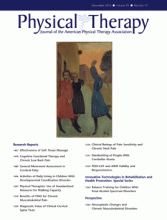Abstract
Background Children with developmental coordination disorder (DCD) face evident motor difficulties in daily functioning. Little is known, however, about their difficulties in specific activities of daily living (ADL).
Objective The purposes of this study were: (1) to investigate differences between children with DCD and their peers with typical development for ADL performance, learning, and participation, and (2) to explore the predictive values of these aspects.
Design This was a cross-sectional study.
Methods In both a clinical sample of children diagnosed with DCD (n=25 [21 male, 4 female], age range=5–8 years) and a group of peers with typical development (25 matched controls), the children's parents completed the DCDDaily-Q. Differences in scores between the groups were investigated using t tests for performance and participation and Pearson chi-square analysis for learning. Multiple regression analyses were performed to explore the predictive values of performance, learning, and participation.
Results Compared with their peers, children with DCD showed poor performance of ADL and less frequent participation in some ADL. Children with DCD demonstrated heterogeneous patterns of performance (poor in 10%–80% of the items) and learning (delayed in 0%–100% of the items). In the DCD group, delays in learning of ADL were a predictor for poor performance of ADL, and poor performance of ADL was a predictor for less frequent participation in ADL compared with the control group.
Limitations A limited number of children with DCD were addressed in this study.
Conclusions This study highlights the impact of DCD on children's daily lives and the need for tailored intervention.
Footnotes
Dr Van der Linde, Dr van Netten, and Dr Shoemaker provided concept/idea/research design and writing. Dr Van der Linde provided data collection. Dr Van der Linde, Dr van Netten, Dr Geuze, and Dr Shoemaker provided data analysis. Dr Van der Linde, Professor Otten, Professor Postema, and Dr Shoemaker provided project management. Professor Postema and Dr Shoemaker provided fund procurement. Dr Shoemaker provided facilities/equipment. Professor Otten, Professor Postema, Dr Geuze, and Dr Shoemaker provided consultation (including review of manuscript before submission).
The authors gratefully acknowledge the valuable contribution of children and parents who participated in the study; teachers, clinicians, and students involved in the data collection; and Fonds NutsOhra for financial support of the project.
This study was approved by the Medical Ethics Committee of the University Medical Center Groningen, the Netherlands.
- Received May 12, 2014.
- Accepted May 21, 2015.












